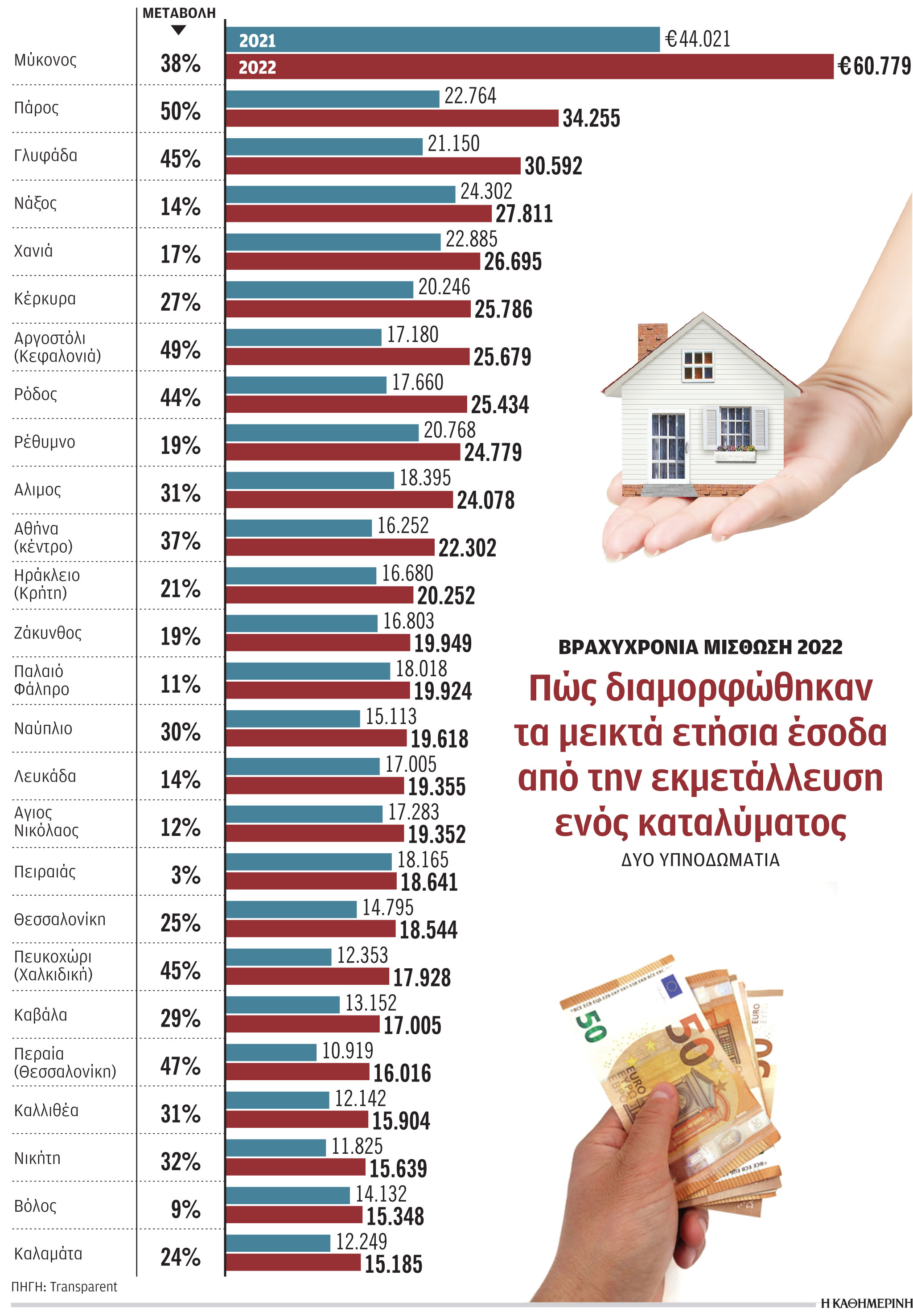
A significant increase in the branch’s revenue was noted short term rental in 2022, when Paros, Argostoli, Peraia (Thessaloniki), Glyfada, Pefkochori in Halkidiki and Athens recorded the biggest growth. In particular, according to the data presented by the research company Transparent at the ShortStay Conference 2023, which took place last weekend at the University of Western Attica, Paros has the largest annual growth of 50%. On the island of Cyclades, two-bedroom property gross annual operating income was €34,255, the second highest after Mykonos, which also increased significantly by 38% to €60,779.
In Athens, growth in 2022 compared to 2021 reached 37% to 22,302 euros, while Glyfada stands out from the rest of the basin with a 45% increase to 30,592 euros, Alimos with a 31% increase to 24,078 euro and Old Faliro rose by 11% to 19,924 euros. As you can see, the southern suburbs and the center of Athens are areas of high demand for short-term rentals in Attica.
In another speech in the context of the conference Company “Key data” noted that in 2022, the total income from short-term rental housing amounted to 3.46 billion euros. The number of overnight stays is estimated at 144,000 throughout the country, and the cost of an overnight stay was 20.87 million euros. At the same time, the average price per night rose to 139 euros from 113 euros in 2021, which is explained, on the one hand, by a surge in demand compared to 2021, and, on the other hand, by price adjustments by owners and managers to compensate for higher housing operating costs due to increased energy costs.
The annual gross income from the operation of a two-bedroom residence in Mykonos is 60,779 euros.
In accordance with transparent analysis, in addition to the increase in placement revenue, there was also a 16% increase in terms of placements. In particular, in January of this year there were 164,868 accommodation facilities. Of these, 10,938 are located in the center of Athens, which is 18% more than in January last year. A large increase of 27% is also seen in Thessaloniki, where the number of places to stay reaches 3090. However, the biggest increase is in Heraklion in Crete, where the number of places to stay is 1307, which is 35% more than in 2022 and 61 % more than in 2021.
Bookings are growing
The picture is also positive in terms of demand this year as, according to Key Data, bookings increased by 43% to 334,218 nights in January this year, with total revenue rising to 370 million euros from 254.6 million euros in the corresponding month. last year. In terms of prices, there seems to be a de-escalation given that the booking was made at the beginning of the year, so there is a relative benefit as well. Thus, bookings for the third quarter were made at an average price of 271 euros/night, compared to 302 euros in the corresponding period last year, when most bookings were made at a later time.
Post-election industry adjustments
At the end of 2023, it appears that any developments and changes to the mode of operation of short-term rentals will be postponed. The upcoming election period has put any action to further regulate the market in question on hold, followed by a summer period during which, according to industry bodies, no changes are foreseen for obvious reasons. But then it looks like there will be a process of public consultation on how the industry can be improved. In this context, as lawyer Daphne Batsara mentioned in the context of a short-term conference, “we should not expect the state to come and legislate. On the contrary, we ourselves, as an industry, must develop legislative proposals to improve the mode of operation of the market.”
One of the changes that appear to be being made concerns the introduction of VAT in line with the relevant EU directive. Although it seems that this will not come into force until January 2025, the market is already preparing for this, as all member states will have to gradually adopt this directive. In practice, according to STAMA representatives who took part in the conference, the introduction of VAT will encourage most private owners either to become pretentious or to transfer the management of their property to professional managers. According to Nasos Gavalas, president of STAMA, “companies will find a way to offset the introduction of VAT through our costs, and we will also have rights such as access to NSRF funds. But private individuals may need pretentiousness, even if it would seem that the sites themselves will pay VAT through which the objects will be rented out. VAT is to be charged at the same rate as for hotels (13%) and this will apply to any rental less than 45 days.
In turn, Stratos Paradias, president of POMIDA, noted that POMIDA has partnered with STAMA (Short Term Property Association) to jointly deliver a number of “truths” and arguments about the industry that “some are artificially silent.” , as he pointed out. According to him, the state itself should ensure a greater supply of real estate for rent for permanent residents, i.е. granting tax incentives, such as reduced tax rates in the case of long-term leases. It should also be clarified that short-term rentals have not taken property off the market, but rather added it, because many properties have been closed for years or are old office and industrial properties that have been converted into housing for this purpose.
Source: Kathimerini
Lori Barajas is an accomplished journalist, known for her insightful and thought-provoking writing on economy. She currently works as a writer at 247 news reel. With a passion for understanding the economy, Lori’s writing delves deep into the financial issues that matter most, providing readers with a unique perspective on current events.